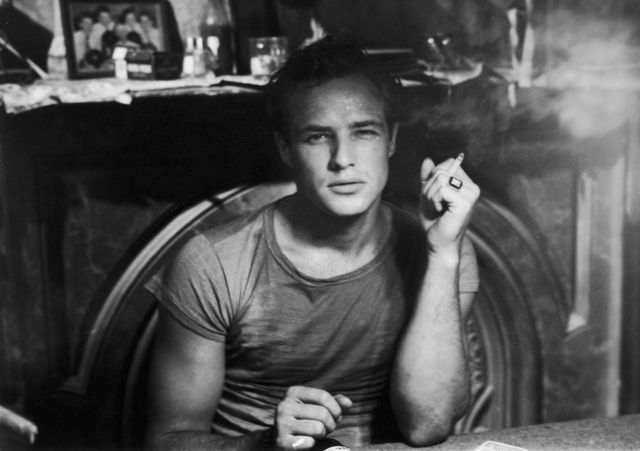Marlon Brando Narrates Documentary In Private, Intimate Audio Recordings
By Joel Wicklund in Arts & Entertainment on Aug 28, 2015 9:14PM

Publicity still from “A Streetcar Named Desire.” (Warner Bros., 1951, Alamy/Courtesy of SHOWTIME.)
Marlon Brando is an undeniably important figure in the history of movie acting. He was arguably the most influential part of a movement (notably including James Dean and Montgomery Clift) that triggered a radical change in screen acting styles. And a handful of his performances are truly brilliant.
That said ... maybe it's time to stop talking so much about Marlon Brando?
Brando's best work is absolutely worth revisiting, but the "Brando mystique"—the reclusive, eccentric, tragic iconoclast—feels like a road too well traveled. This is my main complaint about the otherwise highly-watchable new impressionistic documentary, Listen to Me Marlon, in which hundreds of hours of the actor's private audio recordings form a diary-styled narration in a loose timeline of his life and career.
A glance at Brando's list of credits on IMDB reveals forgettable, sometimes downright awful films far outnumbering the memorable ones. That's true of most prolific actors, but the lazy, cashing-a-check performances of Brando's later career dim his shine considerably. Brando could sleepwalk his way through a movie he felt unworthy of his time (even a good one, like Superman) or come close to undoing a near-masterpiece like Apocalypse Now with his ego-driven antics.
But Brando was the game-changer—one even Robert Duvall (a better pick for the arbitrary "best film actor of all time" label) saw as a hero. So despite squandering his talent through much of his career, his reputation looms larger than all the money grabs, sloth and bizarre—sometimes pantless—behavior.
Listen to Me Marlon is at its best when it focuses on the actor's craft. Between some recordings that show the method performer did indeed think deeply about his work, and film clips of his greatest roles, the documentary does remind one of how wonderful he could be. (That said, playing the movie's overbearing score over Brando's grieving sigh upon hearing of Sonny Corleone's death in The Godfather is inexcusable.)
Undeniably interesting, but less satisfying, are the peeks into Brando's private life, and they comprise much of the running time. Considering the Brando estate approved use of the tapes, Listen to Me Marlon gets credit for not glossing over the actor's personal flaws, but they are covered in by-the-numbers fashion.
Brando was married several times and involved in multiple affairs, with at least 11 children born to different partners, and the movie makes it clear he was not model father or husband material. But the focus on the tragedies involving his son Christian (imprisoned for manslaughter) and daughter Cheyenne (suicide) is revisiting familiar, though compelling and sad, tabloid headlines of the past. The actor's impact, if any, on his other children goes unmentioned.
While Brando's narcissism is evident in several of the audio recordings (including some truly odd self-hypnosis tapes), you have to wonder if less flattering and perhaps more revealing examples were left out. What is in the film is sometimes fascinating, but far from eye-opening. The impression one has of Brando before seeing the movie will likely not change much afterwards.
Director Stevan Riley effectively weaves the recordings in and out of the archival clips and some melancholy footage of the empty Brando home. You never lose interest, and the movie does strike what seems like a reasonable balance between its subject's intense weaknesses and the better side of his humanity. But craft aside, the view of the actor finally feels a bit superficial, despite the unique access to some of his innermost thoughts.
Marlon Brando helped change movies in a real and lasting way. But his legacy is based on a limited body of work and no amount of posthumous eavesdropping will change that. The actor was important. The icon is beginning to feel trivial.
Listen to Me Marlon. Directed by Stevan Riley. 97 mins. No MPAA rating.
Opens Friday, Aug. 28 at Landmark's Century Centre Cinema in Chicago and Renaissance Place Cinema in Highland Park.